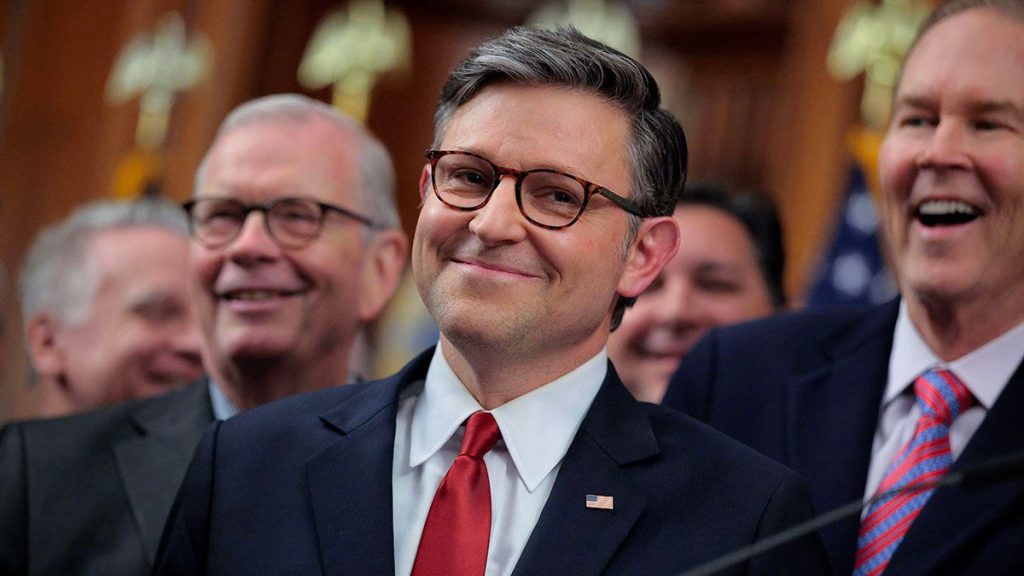Listen to the article
In the midst of a government shutdown that has left millions of Americans concerned about their access to federal food assistance, controversy has erupted over House Speaker Mike Johnson’s role in cutting the Supplemental Nutrition Assistance Program (SNAP).
Reports confirmed that in July 2025, Johnson did indeed vote for and sign the “One Big Beautiful Bill Act,” a sweeping budget bill that included a projected $186 billion in cuts to SNAP over the next decade. The program currently provides food benefits to approximately 42 million Americans, many of whom now face uncertainty about whether they’ll receive their November benefits.
The issue gained significant attention in late October when Rep. Sara Jacobs (D-Calif.) posted on social media about Johnson’s apparent contradiction: expressing regret over Americans potentially losing SNAP benefits while having supported legislation that dramatically cut the program just months earlier. Her post, which included an authentic photo of Johnson and fellow Republicans giving thumbs up after passing the budget bill, quickly spread across multiple platforms.
According to the nonpartisan Congressional Budget Office (CBO), the approved legislation is projected to cut $186 billion from SNAP between 2025 and 2034. The Center on Budget and Policy Priorities characterized these as the largest cuts to SNAP in the program’s history, noting that an earlier version of the bill had proposed even steeper cuts of around $295 billion.
The Associated Press reported that about one-third of the SNAP cuts come from expanded work requirements, which the CBO predicts will force some participants off the program. Another third comes from shifting costs to states that administer SNAP, while the remainder stems from capping annual inflationary adjustments to food benefits.
The timing of this controversy is particularly significant as the ongoing government shutdown threatens immediate SNAP funding. On October 28, Politico reported that during a private call with House Republicans, Johnson acknowledged the impending crisis, reportedly saying “the pain register is about to hit level 10” and that “sadly” 42 million Americans would be affected when SNAP benefits run out of money. According to sources familiar with the call, Johnson added that “we deeply regret it on our side,” while blaming Democrats for the situation.
Economic experts have warned that the impact extends beyond individual recipients. The Center on Budget and Policy Priorities has described SNAP as “an important public-private partnership that helps families afford a basic diet, generates business for retailers and boosts local economies.” Local news outlets across the country have reported that grocery stores, particularly those in rural areas, could face significant financial hardship if SNAP benefits are interrupted.
Food banks are already seeing increased demand. In rural Oregon, for example, local reports indicate empty shelves and growing needs at food banks as families seek alternative sources of assistance.
The political blame game continues to intensify as the shutdown drags on. While Johnson has criticized Democrats for the impasse, he faces scrutiny for supporting substantial cuts to the food assistance program that millions of Americans rely on—a program that has existed in various forms since 1939.
The controversy highlights the real-world consequences of budget decisions and the complex interplay between fiscal policy and social safety nets. As November approaches, both SNAP recipients and retailers that depend on the program face growing uncertainty about what lies ahead.
Johnson’s office has not yet responded to requests for comment on the apparent contradiction between his expressed regrets and his support for legislation that significantly reduced SNAP funding.
Verify This Yourself
Use these professional tools to fact-check and investigate claims independently
Reverse Image Search
Check if this image has been used elsewhere or in different contexts
Ask Our AI About This Claim
Get instant answers with web-powered AI analysis
Related Fact-Checks
See what other fact-checkers have said about similar claims
Want More Verification Tools?
Access our full suite of professional disinformation monitoring and investigation tools




31 Comments
I like the balance sheet here—less leverage than peers.
Uranium names keep pushing higher—supply still tight into 2026.
Good point. Watching costs and grades closely.
Good point. Watching costs and grades closely.
Silver leverage is strong here; beta cuts both ways though.
Silver leverage is strong here; beta cuts both ways though.
Uranium names keep pushing higher—supply still tight into 2026.
Good point. Watching costs and grades closely.
Uranium names keep pushing higher—supply still tight into 2026.
Good point. Watching costs and grades closely.
Good point. Watching costs and grades closely.
Uranium names keep pushing higher—supply still tight into 2026.
Good point. Watching costs and grades closely.
Interesting update on House Speaker Johnson Approves Legislation to Cut $186 Billion from SNAP Program Starting July 2025. Curious how the grades will trend next quarter.
Good point. Watching costs and grades closely.
Good point. Watching costs and grades closely.
I like the balance sheet here—less leverage than peers.
Good point. Watching costs and grades closely.
If AISC keeps dropping, this becomes investable for me.
Good point. Watching costs and grades closely.
Good point. Watching costs and grades closely.
Uranium names keep pushing higher—supply still tight into 2026.
Good point. Watching costs and grades closely.
If AISC keeps dropping, this becomes investable for me.
Good point. Watching costs and grades closely.
Good point. Watching costs and grades closely.
Nice to see insider buying—usually a good signal in this space.
I like the balance sheet here—less leverage than peers.
Good point. Watching costs and grades closely.
Exploration results look promising, but permitting will be the key risk.
Good point. Watching costs and grades closely.